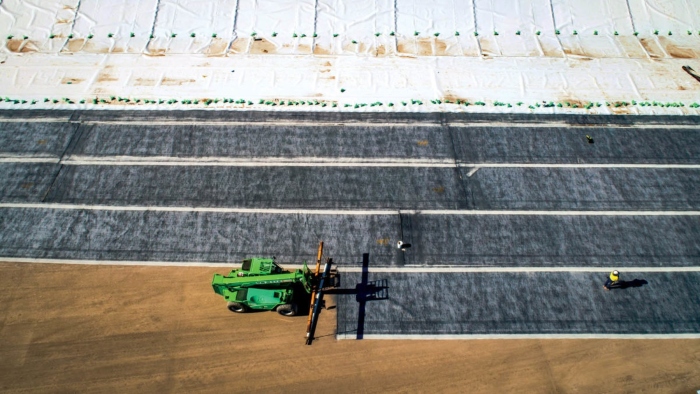Geosynthetic Institute landfill failure webinar on April 20 will focus on 20 lined and unlined municipal solid waste (MSW) landfill failures.

The Geosynthetic Institute (GSI) will sponsor a webinar, “Behavior and Analysis of Twenty Solid Waste Landfill Failures,” on April 20, from 11:30 a.m. to 1 p.m. EDT. Geosynthetic Materials Association (GMA) member companies and their employees receive discounted rates on all GSI webinar and short course registrations.
In comparison to the number of worldwide solid waste landfills that exist, the incidence of landfill failures is extremely small. Nevertheless, when they do fail the mass of waste involved has been enormous. Six of the twenty failures described in this webinar involved more than 35.3 million cubic feet (1 million m3) of waste and three involved deaths. The analysis of each failure using the computer program ADAMA Engineering Inc.’s ReSSA (3.0) (latest version: ReSSA+) identified the most sensitive unknown variable, while individual project reports identified the “triggering mechanism” that brought the already low factor of safety (FS) value into a failure state. Some of the salient findings follow:
- Seven of eleven unlined cases were rotational failures
- Eight of nine lined cases were translational failures
- Service lifetimes were from one week to decades
- Duration of failures was from one minute to a few hours
- Average height of waste mass was 85.3 feet (26 m)
- Height-to-length of failed waste was approximately 0.42
- Average density of waste was 1.8 psi (12.1 kN/m3)
- Average waste shear strength was 26° and 1.9 psi (13 kPa)
- Geomembrane shear strength varied from 5.1° to 16.2° (none were textured)
- Waste and liner shear strength were the greatest uncertainties
- Liquids were involved in all 20 cases (i.e., in the waste, liner system or foundation soil, and it was invariably the “trigger” causing failure)
This webinar will convince all involved and interested in landfill technology of the serious implications of failure and of the necessity for proper design, as well as proper construction, waste filling, cover and maintenance practices. It is important to note that the unlined landfill failures that will be discussed occurred between 1973 and 2008, whereas the lined failures to be discussed happened between 1987 and 2002. The few recent failures in both categories are not included due to insurance or litigation concerns.
This webinar will convince all involved and interested in landfill technology of the serious implications of failure and of the necessity for proper design, as well as proper construction, waste filling, cover and maintenance practices
Learning objectives of the Geosynthetic Institute landfill failure webinar
Participants will become familiar with the methods and idiosyncrasies of solid waste landfill failures. Different trajectories of failures (rotational or translational) will be identified and described where they occurred. The computer analyses will clearly show the importance of having accurate shear strengths for both the solid waste and the liner system. The negative implications of liquids in the waste, liner or foundation will be highlighted.
Webinar benefits
- Understand the idiosyncrasies of solid waste failures
- Learn about the circumstances leading to the failures
- Learn the significance of representative shear strengths to the FS values
- Learn about the negative impacts of liquids to the FS values
- Understand the negative implications that such failures have on the credibility of landfilling practice and everyone involved in it
Intended audiences
The Geosynthetic Institute landfill failure webinar will be useful for public and private owners/operators of landfills, heap leach mining operations, combustion coal residuals and related solid waste facilities; consultants and designers in the private sector; regulators and agency personnel at the federal, state and local levels; geosynthetic manufacturers and their representatives; geotechnical and geosynthetic testing organization personnel; contractors and installers of liner and cover systems; academic and research groups; and others desiring technically related information on this important aspect of our constructed infrastructure.
Specific topics covered
- Background of webinar
- Overview of analysis method
- Unlined (or soil-lined) cases
- Geosynthetic-lined cases
- Summary and conclusions
- Recommendations
Geosynthetic Institute landfill failure webinar instructor
George R. Koerner, Ph.D., P.E., and CQQ, is the director of the Geosynthetic Institute. He oversees laboratory accreditation, field certification and continuing education at the institute. He also manages several research projects and has published more than 350 technical papers in his 35-year association with polymers used in below-ground construction. Koerner’s Ph.D. is from Drexel University in geotechnical engineering. He is a registered professional engineer and a certified quality auditor. Koerner has received many awards over the years. The most notable being IFAI’s Environmental Technologies Award of Excellence 1995, ASCE’s DVGI Geotechnical Engineer of the year in 2004, the title of ASTM Fellow in 2013 and GMA’s first Robert M. Koerner Lecture and Award in 2017.
Webinars cost $200.00 for GSI and GMA members, and $250.00 for nonmembers. Successful completion of a multiple-choice test after the webinar carries 1.5 professional development hours (PDH).
For more information or to register, visit the GSI webinar webpage.
 TEXTILES.ORG
TEXTILES.ORG


